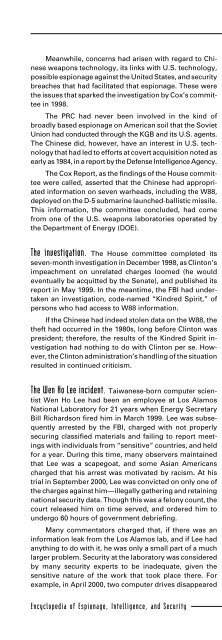ENCYCLOPEDIA OF Espionage, Intelligence, and Security Volume ...
ENCYCLOPEDIA OF Espionage, Intelligence, and Security Volume ...
ENCYCLOPEDIA OF Espionage, Intelligence, and Security Volume ...
Create successful ePaper yourself
Turn your PDF publications into a flip-book with our unique Google optimized e-Paper software.
Chinese <strong>Espionage</strong> against the United StatesMeanwhile, concerns had arisen with regard to Chineseweapons technology, its links with U.S. technology,possible espionage against the United States, <strong>and</strong> securitybreaches that had facilitated that espionage. These werethe issues that sparked the investigation by Cox’s committeein 1998.The PRC had never been involved in the kind ofbroadly based espionage on American soil that the SovietUnion had conducted through the KGB <strong>and</strong> its U.S. agents.The Chinese did, however, have an interest in U.S. technologythat had led to efforts at covert acquisition noted asearly as 1984, in a report by the Defense <strong>Intelligence</strong> Agency.The Cox Report, as the findings of the House committeewere called, asserted that the Chinese had appropriatedinformation on seven warheads, including the W88,deployed on the D-5 submarine launched-ballistic missile.This information, the committee concluded, had comefrom one of the U.S. weapons laboratories operated bythe Department of Energy (DOE).The investigation. The House committee completed itsseven-month investigation in December 1998, as Clinton’simpeachment on unrelated charges loomed (he wouldeventually be acquitted by the Senate), <strong>and</strong> published itsreport in May 1999. In the meantime, the FBI had undertakenan investigation, code-named “Kindred Spirit,” ofpersons who had access to W88 information.If the Chinese had indeed stolen data on the W88, thetheft had occurred in the 1980s, long before Clinton waspresident; therefore, the results of the Kindred Spirit investigationhad nothing to do with Clinton per se. However,the Clinton administration’s h<strong>and</strong>ling of the situationresulted in continued criticism.The Wen Ho Lee incident. Taiwanese-born computer scientistWen Ho Lee had been an employee at Los AlamosNational Laboratory for 21 years when Energy SecretaryBill Richardson fired him in March 1999. Lee was subsequentlyarrested by the FBI, charged with not properlysecuring classified materials <strong>and</strong> failing to report meetingswith individuals from “sensitive” countries, <strong>and</strong> heldfor a year. During this time, many observers maintainedthat Lee was a scapegoat, <strong>and</strong> some Asian Americanscharged that his arrest was motivated by racism. At histrial in September 2000, Lee was convicted on only one ofthe charges against him—illegally gathering <strong>and</strong> retainingnational security data. Though this was a felony count, thecourt released him on time served, <strong>and</strong> ordered him toundergo 60 hours of government debriefing.Many commentators charged that, if there was aninformation leak from the Los Alamos lab, <strong>and</strong> if Lee hadanything to do with it, he was only a small part of a muchlarger problem. <strong>Security</strong> at the laboratory was consideredby many security experts to be inadequate, given thesensitive nature of the work that took place there. Forexample, in April 2000, two computer drives disappearedEncyclopedia of <strong>Espionage</strong>, <strong>Intelligence</strong>, <strong>and</strong> <strong>Security</strong>from a high-security area <strong>and</strong> reappeared two monthslater behind an office copier in another part of the facility.<strong>Security</strong> breaches such as these prompted Congress tocreate the National Nuclear <strong>Security</strong> Administration (NNSA)as a means of better protecting sensitive properties—<strong>and</strong>partially removing oversight of those materials from Richardson’sDOE.The title of an article in the Wall Street Journal calledthe Wen Ho Lee case a “diversion,” <strong>and</strong> certainly the casedid create more questions than answers concerning Chineseespionage. One of the reasons U.S. authorities havehad a difficult time pinning charges of spying on theChinese is that much of their information seems to havecome from open sources. This became apparent with the“discovery” of a 1991 volume, published in Chinese inBeijing, titled Sources <strong>and</strong> Techniques of Obtaining NationalDefense Science <strong>and</strong> Technology.Authors Huo Zhongwen <strong>and</strong> Wang Zongxiao, bothPRC intelligence officers, were frank in stating that Westerntechnical journals “are the first choice of rank <strong>and</strong> fileS&T [science <strong>and</strong> technology] personnel as well as intelligenceresearchers.” Serendipity, combined with failedsecurity measures, also played a part; in the 1970s, theU.S. government had accidentally declassified more than19,000 documents on thermonuclear weapons. “This incident,”wrote Huo <strong>and</strong> Wang, illustrates that “…there is ar<strong>and</strong>om element involved in the discovery of secret intelligencesources, <strong>and</strong> to turn this r<strong>and</strong>omness into inevitability,it is necessary that there be those who monitorsome sectors <strong>and</strong> areas with regularity <strong>and</strong> vigilance.”This statement is all the more ironic in light of the fact thata copy of Sources <strong>and</strong> Techniques, which first came toU.S. attention in 1999, had been sitting in the Library ofCongress for seven years.Though the intricacies of the putative Chinese spysc<strong>and</strong>al in the late 1990s will perhaps never be known, itappears that much of the information the PRC acquiredwas not a result of subterfuge, but rather of Westernopenness—<strong>and</strong>, in some cases, the incompetence of individualscharged with guarding secrets. In any case, thepoint became all but moot after September 11, 2001. Notonly did the United States have far worse concerns thanChina, but President George W. Bush needed Chinesesupport for America’s war on terror. The issue of Chineseespionage, therefore, was not so much resolved as it wasset aside.❚ FURTHER READING:BOOKS:Cox, Christopher. U.S. National <strong>Security</strong> <strong>and</strong> Military/Commercial Concerns with the People’s Republic ofChina. Washington, D.C.: U.S. Government PrintingOffice, 1999.Stober, Dan, <strong>and</strong> Ian Hoffman. A Convenient Spy: Wen HoLee <strong>and</strong> the Politics of Nuclear <strong>Espionage</strong>. New York:Simon <strong>and</strong> Schuster, 2001.191







![The Big Lie 9-11 and Government Complicity in Mass Murder [PDF]](https://img.yumpu.com/50957077/1/190x245/the-big-lie-9-11-and-government-complicity-in-mass-murder-pdf.jpg?quality=85)








